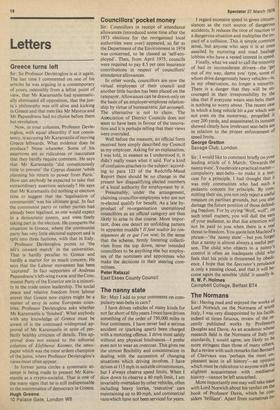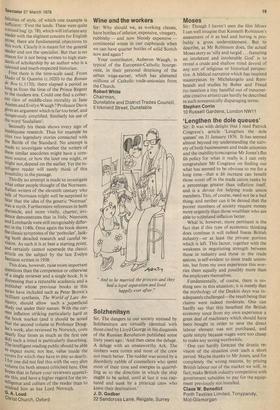The Normans Sir: Having read and enjoyed the works of
Lord Norwich on the Normans of south Italy, I was very disappointed by his facile, indeed at times fatuous, review of the recently published works by Professors Douglas and Davis. As an academic whose research field is the Normans of Italy roY standards, I would agree, are likely to be more stringent than those of many others. But a review with such remarks that Bernard of Clairvaux was 'perhaps the most unpleasant saint in all history'—an opinion which must be ridiculous to anyone with the slightest acquaintance with mediaeval history—cannot be left unscathed.
More importantly one may well take issue with Lord Norwich about his verdict on the book of Professor Davis, which he considers 'brilliant'. Apart from numerous In'
felicities of style, of which one example is Sufficient: 'First the lands. These were quite a mixed bag' (p. 78), which will infuriate any reader with the slightest concern for English Prose, there are fundamental objections to this work. Clearly it is meant for the general reader and not the specialist. But that is no reason for it not being written to high standards of scholarship by an author who is a talented and much-respected historian. First there is the time-scale used. From Duclo of St Quentin (c.1020) to the Roman de Rou (c.1170), there elapsed a period as long as from the time of the Prince Regent to the modern era. Could one find a coherent view of middle-class morality in Jane Austen and Evelyn Waugh ? Professor Davis gives an argument which is far too brief, and dangerously simplified. Similarly his use of the word 'feudalism'.
Secondly his thesis shows every sign of inadequate research. Thus for example he Cites two legendary stories connected with the Battle of the Standard. No attempt is Made to investigate whether the writers of these similar anecdotes might have a common source, or how the later one might, or might not, depend on the earlier. Yet the intelligent reader will surely think of this Possibility in the passage.
Thirdly no attempt is made to investigate What other people thought of the Normans. Italian writers of the eleventh century who talk of Normans might well be surprised to hear that the idea of the generic 'Norman' was a myth. Furthermore references in both chronicle, and more vitally, charter, evidence demonstrates that in Italy, Normans and Lombards were still recognisably different in the 1140s. Once again the book shows the classic symptoms of the 'potboiler', lacking both detailed research and careful revision. As such it is at best a starting point, and certainly cannot supersede the classic article on the subject by the late Evelyn Jamison written in 1938.
This does, however, raise more important thiestions than the competence or otherwise of a single reviewer and a single book. It is distressing that a reputable academic and a Publisher whose previous books in this series have included such as Peter Brown's brilliant synthesis, The World of Late Antiquity, should allow such a ,superficial study out under their names. With the current inflation striking particularly hard at the book market (and it should be noted that the second volume in Professor Douglas's work, also reviewed by Norwich, costs nearly four times as much as the first one did) such a trend is particularly disturbing. The intelligent reading public should be able to expect more, not less, value inside the covers for which they have to pay so dearly. I for one did not feel this with the very slim volume (in both senses) criticised here. One hopes that in future your reviewers appreciate this and have a higher regard for the intelligence and culture of the reader than to Mislead him as has Lord Norwich. Q. A, Loud
Christ Church, Oxford



































 Previous page
Previous page